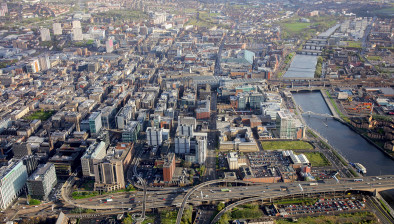Social housing projects to benefit from Glasgow City Region 5G funding

The UK Government Department for Science, Innovation and Technology has confirmed Glasgow City Region as one of ten successful 5G Innovation Regions, which are set to share funding of £36 million for a range of projects.
The funding is part of a wider UK Government ambition to drive telecoms innovation.
Projects will showcase the transformative effect that advanced wireless connectivity and digital technologies can provide, with each Region promoting local good practise and learning and pushing wider adoption across the area, with a particular focus on public services.
The Region’s projects will deliver wide-ranging economic and community benefits by demonstrating the demand for, and benefits of 5G and advanced wireless technologies across the social housing and health and social care sectors.
Speaking on behalf of the eight Glasgow City Region councils, Susan Aitken, chair of the Glasgow City Region Cabinet and Glasgow City Council leader said: “Our selection as a 5G Region is testament to the huge strides the Glasgow City Region has taken in the recent past.
“In the past 18 months, recognition of Metropolitan Glasgow as a place where world-leading innovation is done has helped secure almost a quarter of a billion pounds in Government investment.
“Our strengths and assets are generating the employment, training, and productivity outcomes our citizens need and our economy demands and our selection as a 5G innovation region will help take that further.
“5G is already transforming the services we provide to communities and this funding will support our use of technology to making people safer in their homes and providing them with more efficient, healthy and inclusive outcomes.”
Various innovative uses of Internet of Things (IoT) and smart applications are already being adopted in social housing across the Region.
Projects which form part of the project cover four workstreams.
Asset Monitoring and Maintenance:
Enabling further deployment of IoT sensors to monitor residential environmental conditions. Monitoring real time environmental conditions like humidity and temperature levels can allow for early detection of mould issues. This allows housing providers to target problem areas, prioritise maintenance activities and avoid costly remediation efforts to property. Mould can cause respiratory problems, by proactively monitoring mould you can create a healthier environment for residents. Energy consumption related to dehumidification can also be optimised, leading to significant cost savings in terms of energy bills.
- Partners: All eight Glasgow City Region councils, I-OPT, CENSIS, Wheatley Group, North Glasgow Housing Association.
Net Zero Social Housing:
Assessing the impact of technology to optimise energy use. IoT can play a significant role in achieving net-zero housing. The real time monitoring of data from heating systems, solar panels and building fabric can lead to better occupant experiences, reduced energy consumption and carbon footprint and lower energy bills.
- Partners: All eight Glasgow City Region councils, CENSIS, Wheatley
Health and Social Care Monitoring:
Enabling further digitalisation of home care, ahead of 2025 digital telecare switchover. IoT can be used to monitor and track the health and well-being of a patient remotely. Checking vital signs that could alert healthcare providers in case of abnormalities, improve outcomes for patients and reduce healthcare costs.
- Partners: All eight Glasgow City Region councils, GHSCP, CENSIS.
Data Aggregation:
Exploring opportunities for data aggregation from sensor deployments. Collection of data across different sensors can lead to improved data quality and availability, which can improve real time decision making.
- Partners: All eight Glasgow City Region councils, GHSCP, CENSIS, IOPT, Wheatley Group, North Glasgow Housing Association
Learning and data from these projects will be collated to deliver a series of business cases which will serve to encourage wider local adoption of these technologies to drive better efficiencies and services for communities, and importantly to generate investment in these new technologies at a local level, creating more supply chain opportunities, growing Regional specialism in these technologies and job opportunities in related industries.
UK Government minister of data and digital infrastructure Sir John Whittingdale said: “We’re channelling millions into local areas to unlock the potential of cutting-edge 5G wireless and digital technologies which will reshape our public services, drive economic growth and boost innovation. This new fund will give local areas from across the country the opportunity to be at the forefront of Britain’s world-leading 5G revolution.
“For instance, by using 5G for farming and creating science parks, we’re not just helping local communities, but also encouraging new ideas all over the UK. This is more than just linking smartphones. It’s about using powerful digital connections to transform various sectors in the economy and the public sector throughout the entire country.”
Glasgow City Region’s project will involve working with the local councils and a range of social housing providers, health and social care providers, the academic community, and IoT technology and network connectivity providers who have already signed up to a detailed delivery plan.
The project funding will enable extensive learning from existing good practise to support how this can be scaled up and applied more consistently and at a lower cost to the social housing sector and their residents.
Benefits will include cost savings and productivity gains through increased technology adoption to support proactive operations and maintenance of social housing assets. Improved welfare through better housing conditions and enhanced health and social care will drive inclusive economic growth.
Further benefits include energy optimisation, saving money for residents and providers, easing the cost-of-living crisis, and generating economic growth.









